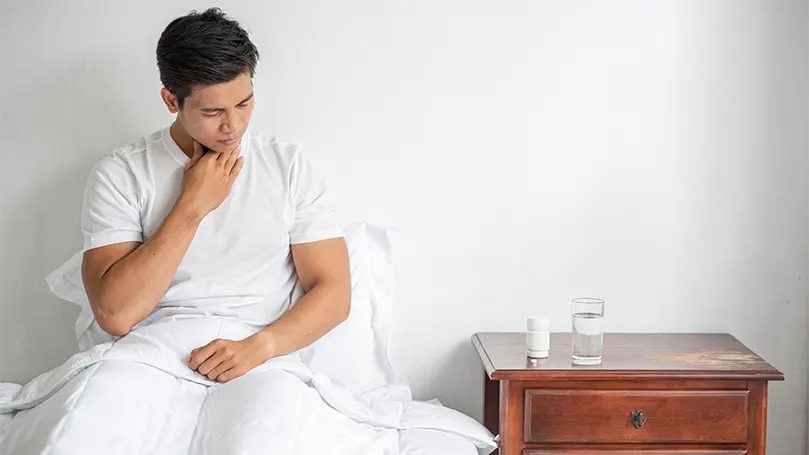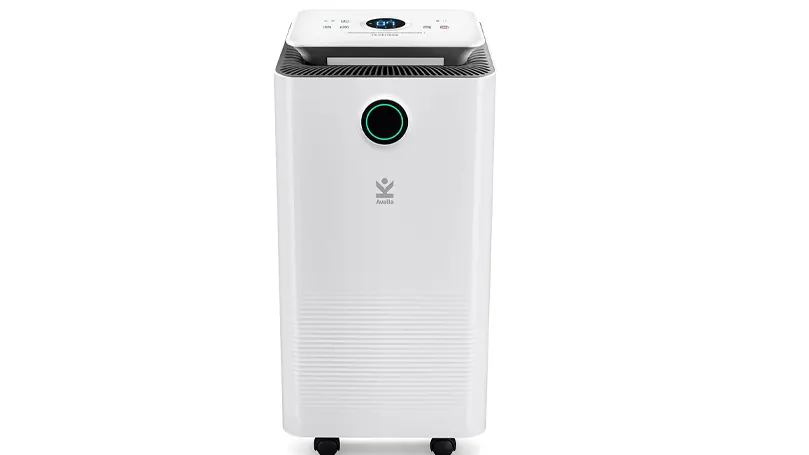Is it physically possible to cough while sleeping?
If we had to answer this question with yes or no, our answer would be no. But the question is undoubtedly more complex and requires an explanation. Do you know that one sleep cycle consists of four sleep phases? Those four phases are divided into non-REM and REM. REM sleep is a period of deep sleep. During one night, the sleep cycle is repeated several times, usually about 5 times.
Related reading:
During rapid eye movement (REM) sleep, it is not possible to cough. We can say that you are paralysed in those moments. If it is not so, you would be very active during the night because everything you do in your dream would be repeated in reality. Sleepwalking is an exception, but we have already covered that topic in a separate article. You can cough during non-REM sleep because these are periods of light sleep. Keep in mind that there are certain health conditions that can cause coughing even during deep sleep, and such conditions are usually very dangerous.
What are the main causes of cough in sleep?
In over 90% of cases, the cause of cough in sleep is one of the following health conditions. Although these are quite common health conditions, it does not imply that they are harmless and that you should not seek the help of a doctor. This article should not be used as substitute for the advice of a medical professional.
Chronic cough
People who suffer from chronic cough become so used to the condition that they almost stop paying attention to it. That's a major mistake. The cause of chronic cough will probably not go away by itself. Chronic cough is not a lifelong condition, but the underlying medical condition must be cured and then the cough will disappear. It can be a symptom of cancer and other dangerous illnesses so neglecting chronic cough may turn out to be fatal.
Related reading:
Obstructive sleep apnea
The increase in the number of obese people has led to a spike in the number of cases of obstructive sleep apnea. Obstructive sleep apnea is significantly more common than central sleep apnea, but there are patients who suffer from both. You cannot diagnose sleep apnea yourself, but someone must suggest to you that you have pauses in breathing during the night, which are accompanied by snoring, coughing and gasping.
GERD

If you suffer from gastroesophageal reflux disease (GERD), you should see a gastroenterologist, not a pulmonologist. When the oesophagal sphincter becomes weak, it can no longer successfully keep stomach acid away from your throat, and acid reflux becomes frequent. Coughing is the body's natural defence mechanism to clear the throat of stomach acid. The doctor will probably prescribe some type of medication for GERD, but you must also take care of nutrition and improve your lifestyle.
Related reading:
Infections
Any respiratory infection may lead to a cough in your sleep. When that part of the body is infected, the mucous membrane will produce too much mucus in response which will lead to postnasal drip. Then you will constantly have the need to clear your throat, but that feeling will go away only when the postnasal drip stops. The use of decongestants before sleep is helpful.
Related reading:
Allergies

Among other unpleasant symptoms caused by allergies, allergies related to pollen are particularly notorious for tickling and dry cough. You feel as if your throat is completely dry even though you are hydrating, and you also have the impression that someone is tickling your throat with a feather.
Tens of millions of people globally suffer from this problem, especially during the spring months. So, sleeping with allergies is a common problem as well.
Sleeping on an declined surface
Maybe your neck is not in the right position and that's why the saliva slides where it shouldn't. Consider whether the pillow you are sleeping on is suitable for your sleep position and body frame. If changing your pillow can solve the problem of coughing in your sleep, you're lucky, it's the easiest solution.
Related reading:
Is there any medicine to prevent coughing in your sleep?

There are medications whose primary purpose is to stop coughing. Such medications can be used if the cause is cough cold or allergies. If the cough is caused by some other medical condition, then it is necessary to address the problem in another way.
The two types of cough medication most commonly used are suppressants and expectorants. Suppressants, as the name suggests, should suppress cough and are therefore ideal before bedtime. They often contain substances that act on the central nervous system, so they will stop the cough and make you sleepy. Expectorants loosen mucus and then it is easier for you to expel it from the airways.
But expectorants should not be taken in the afternoon and evening, otherwise, you probably won't be able to fall asleep. Although the cough will last shorter thanks to the expectorants, at first you will cough more because the expectorants will stimulate the expulsion of mucus.
How to get rid of a cough in your sleep?
If the cough is not a consequence of a cold or if you do not want to take medications, consider other approaches that have proven to be very useful in this situation.
Of course, this isn't a complete list and we're sure a lot of you have your own home remedies. In fact, feel free to share your anti-cough solutions down in the comment section to help everyone out! But for now, let's go over the practices that we recommend trying.
Run a humidifier

Your home should definitely not be humid because it is harmful both for your health and for the walls, furniture and home in general. If you notice a dump in the room, buy a dehumidifier. But the air should not be too dry because it can cause coughing and make you susceptible to infections. A humidifier is recommended if you feel the air is too dry, which frankly isn't the case very often in the UK.
Get an air purifier
The air has never been as polluted in history as it is today. This leads to climate changes, and extremely hot temperatures that hit London and the rest of the UK, breaking previous records are best possible indicator of the current situation. It is necessary that we all take steps to preserve the environment, and what you can do for yourself right now is to buy an air purifier. After just a few minutes, you will notice that the air in the home is much more pleasant to breathe.
CPAP
Continuous positive airway pressure (CPAP) is a form of ventilation that is used to treat more severe forms of sleep apnea. CPAP will ensure that the airways remain open while you sleep and that you will be able to breathe normally. This is very important for sleep quality and for maintaining a healthy heart.
Related reading:
Quit smoking
The harmful effects of smoking have been known since the 50s, but for some reason, a large number of people still smoke. There is a noticeable trend that from year to year fewer and fewer people have this harmful habit. That's great, and if you are among those who still smoke, quit as soon as possible. You will be doing yourself a big favour.
Treat asthma (if suffering from it)
If you leave asthma untreated, you risk suffering permanent damage to your lungs and airways. Lung scarring will appear, which will affect the quality of your life as long as you live. When you reach this stage, the damage done is irreversible. That's why you have to treat asthma before irreversible consequences have occurred.
Conclusion
A nighttime cough is very annoying because you usually cough worse after you go to bed. You can try to reduce or stop nocturnal cough by using cough suppressants that affect the cough reflex. This is especially true if you suffer from a common cold, upper respiratory infections or the flu.
When you suffer from another condition, then the treatment approach is different and often includes antihistamines, CPAP and other methods. If you wake up coughing, it is likely that you were in a light sleep phase. After you go to the doctor, he or she will perform the necessary checks and then you will know what the next steps are. Also, a medical check-up will show whether you suffer from one of the conditions that can even cause a cough during REM sleep.
In other words, can you cough in your sleep? Yes. Is it dangerous? It can be dangerous or completely incosequential.
Spread the word
Recommended reading:















There are no comments yet
"*" indicates required fields